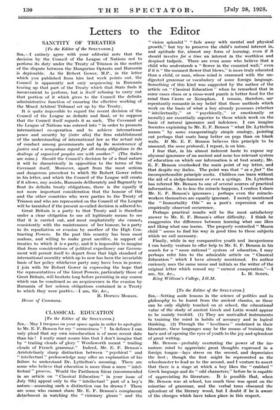Letters to the Editor
SANCTITY OF TREATIES
[To the Editor of the SPECTATOR.] SIR,—I entirely agree with your editorial note that the decision by the Council of the League of Nations not to perform its duty under the Treaty of Trianon in the matter of the dispute between the Hungarian Optants and Rumania is deplorable. As Sir Robert Gower, M.P., in the letter which you published from him last week points out, the Council is apparently not only acquiescing in Rumania tearing up that part of the Treaty which that State finds it inconvenient to perform, but is itself refusing to carry out that portion of it which gives to the Council the definite administrative function of ensuring the effective working of the Mixed Arbitral Tribunal set up by the Treaty.
It is quite impossible to regard the recent decision of the Council of the League as definite and final, or to suppose that the Council itself regards it as such. The Covenant of the League of Nations was entered into " in order to promote international co-operation and to achieve international peace and security by (inter alia) the firm establishment of the understanding of international law as the actual rule of conduct among governments and by the maintenance of justice and a scrupulous regard for all treaty obligations in the dealings of organized peoples one with another." (The italics are mine.) Should the Council's decision be of a final nature it will be diametrically in opposition to the terms of the Covenant itself. Moreover, apart from the most serious and dangerous precedent to which Sir Robert Gower refers in his letter, and which the Council of the League will create if it allows, nay assists, Rumania deliberately and flagrantly to flout its definite treaty obligations, there is the equally if not more important consideration that the honour of this and the other countries who were parties to the Treaty of Trianon and who are represented on the Council of the League will be tarnished if the present so-called decision is adhered to.
Great Britain is a party to that Treaty and is therefore under a clear obligation to use all legitimate means to see that it is carried out, and most emphatically she cannot, consistently with the maintenance of her honour, be a party to its repudiation or evasion by another of the High Con- tracting Powers. In the past this country has been most zealous, and willing to make great sacrifice, in support of treaties to which it is a party, and it is impossible to imagine that from considerations of political expediency our Govern- ment will permit itself to depart from that high standard of international morality which up to now has been the invariable basis of her policy whichever party may have been in power. I join with Sir Robert Gower in expressing the hope that the representatives of the Great Powers, particularly those of Great Britain, will hesitate long before persisting in any course which can be construed as an acquiescence in the evasion by Rumania of her solemn obligations contained in a Treaty to which they were parties.—I am, Sir, &c.,




































 Previous page
Previous page